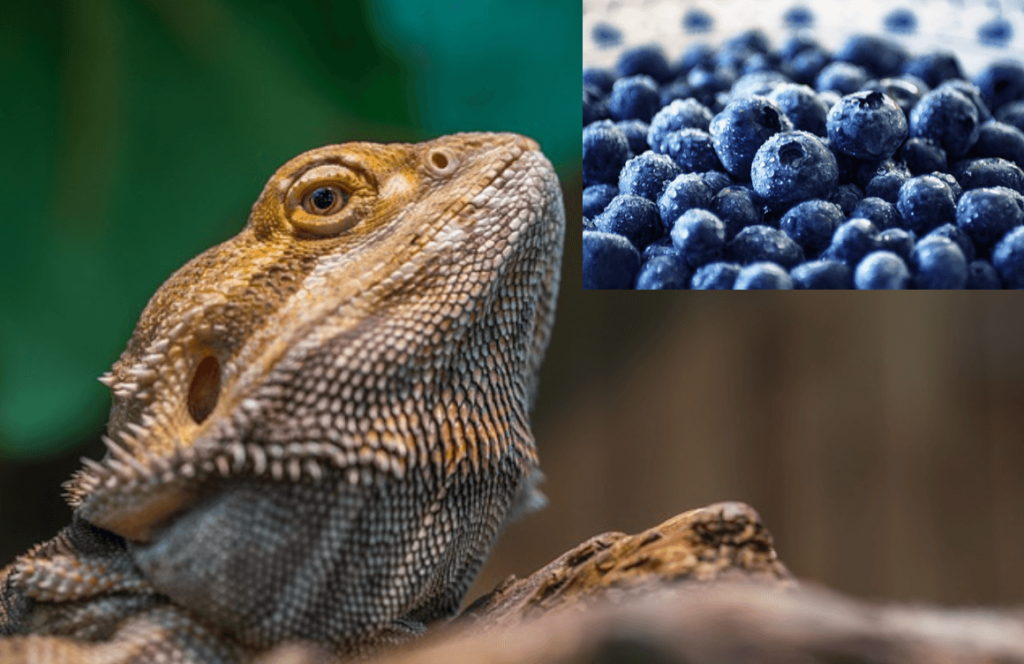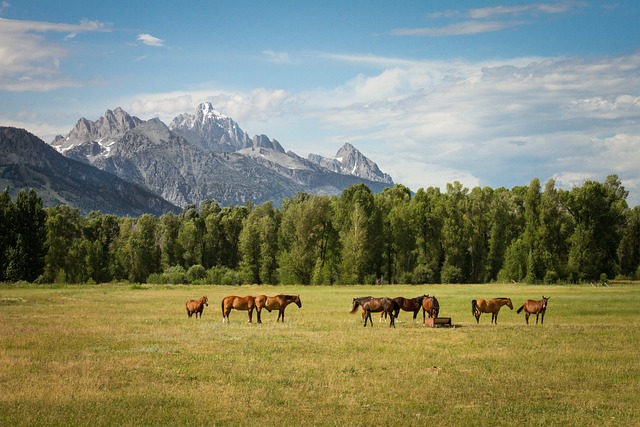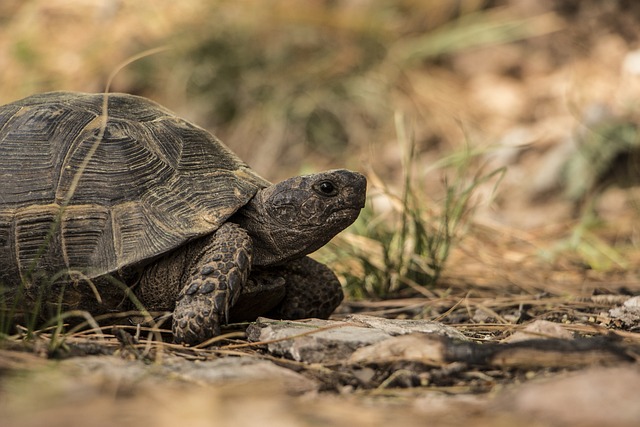If you’re wondering “can bearded dragons eat rose blueberries?” the answer is a resounding yes! You can feed bearded dragon blueberries, and it can be a staple in their fruit diet, so they can eat blueberries about once a week.
In this article, we’ll explore the nutritional value of blueberries for bearded dragons and how to feed them properly. As well, see our full guide to what berries bearded dragons can eat here.
Can bearded dragons eat blueberries?
- Can bearded dragons eat blueberries?
- Nutritional value of blueberries for bearded dragons:
- How many blueberries can a bearded dragon eat?
- Why can’t bearded dragons eat blueberries or fruit daily?
- How should I feed my bearded dragon blueberries?
- Should I feed my beardie frozen blueberries?
- Frequently Asked Questions (FAQ):
- Foods bearded dragons can eat:
- Getting your bearded dragon calcium:
- Vegetables to feed your bearded dragon:
- Insects to feed your bearded dragon:
- How often should you feed a bearded dragon?
- What should a bearded dragon not eat?
- Recap: Can bearded dragons eat blueberries?
Nutritional value of blueberries for bearded dragons:
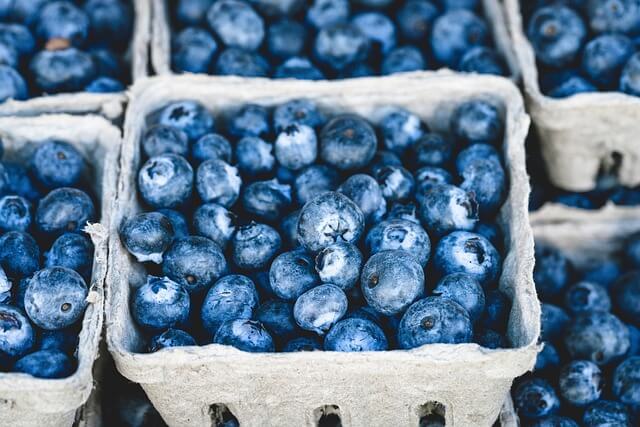
Blueberries are especially beneficial for bearded dragons because of their:
- Vitamin C (good for beardie’s immune system)
- Vitamin K1
- Antioxidants in blueberry skin
- Hydration
- Protein
- Fiber
- Manganese
- Small amounts of Vitamin E, B6, and copper
Source: Heathline
How many blueberries can a bearded dragon eat?
You can give your bearded dragon a few blueberries once a week. Why can’t you give them blueberries daily? Well, beardies actually shouldn’t eat fruit daily. Their diets should be primarily insects and vegetables, with fruits sprinkled in once or twice a week.
Why can’t bearded dragons eat blueberries or fruit daily?
Fruit and blueberries have too much sugar for bearded dragons to eat regularly. Too much sugar will lead your dragon towards obesity, health problems, and possibly even diabetes and a shorter lifespan.
Bearded dragons are a lot like humans in that too much sugar hurts them. Your pet is also the beardie equivalent of a couch potato, because they’re likely kept inside most of the day instead of in the wild, roaming and burning calories all day. This is another reason to closely monitor their sugar and fruit intake.
As well, it’s important to limit the amount of phosphorus rich foods, like blueberries, in a beardie’s diet. Why? Phosphorus can inhibit the absorption of calcium in your bearded dragon’s body. Calcium is probably the most important nutrient for your bearded dragon to get, both when they’re growing juveniles and as they mature into adulthood. It’s good to have a ratio of 2:1 as in two parts calcium to one part phosphorus in their diets. More on calcium rich foods and best practices below.
How should I feed my bearded dragon blueberries?
First, make sure your blueberries aren’t going off. Wash them, and then drop them whole into your bearded dragon’s food bowl. You can mix the blueberries in with other vegetables and insects if you’d like. If you’re feeding a baby or juvenile bearded dragon, you can cut up the blueberries into smaller pieces that will be easier for them to chew.
Should I feed my beardie frozen blueberries?
Frozen fruit in general has less nutrients than fresh fruit. So it’s best to feed your beardie fresh blueberries. However, they can eat frozen blueberries in a pinch. It’s always best to buy organic produce, whether frozen or fresh, to ensure no pesticides get into your little beardie’s body.
Frequently Asked Questions (FAQ):
What fruit is toxic to bearded dragons?
High acid fruit like citrus should never be fed to your bearded dragons. This includes lemons, limes, oranges, grapefruits, and kumquats. As well, avoid feeding them avocados!
What berries can bearded dragons not eat?
Bearded dragons can eat almost every berry, although they should be given to them sparingly as a treat. Fruit in general should only make up between 5 to 20% of their diet. Frozen fruit isn’t a great option for them as well, as there’s less water content and less nutrients overall in frozen fruit. Stick to fresh berries given once or twice a month.
What fruit can bearded dragons eat daily?
Besides blueberries, some fruit that bearded dragons can eat daily include: melons, peaches, raspberries, pears, and apples.
What foods do bearded dragons love most?
Bearded dragon’s favorite food would have to be live bugs, which is typically crickets or roaches.
Can Beardies eat carrots every day?
No, while bearded dragons can eat carrots, they should not eat them daily. Stick to feeding them cleaned and cut up carrots every week or two. While they have great health benefits for bearded dragons, they aren’t used to eating carrots regularly and should be kept to eating insects and other plant matter for their daily diet.
Can bearded dragons eat watermelon?
Bearded dragons can eat watermelon, although sparingly. A good rule of thumb is to feed them a small cube, about 1 centimeter wide, once a month or less.
Can bearded dragons eat apples?
Yes! Apples are one of the safer fruits for beardies to eat. They can be fed apples weekly.
Can bearded dragons eat grapes?
Yes, bearded dragons can eat grapes, sparingly. Although high in calcium, they are also high in oxalates, which can harm a beardie’s digestion and overall health. Stick to feeding them grapes every few weeks at most.
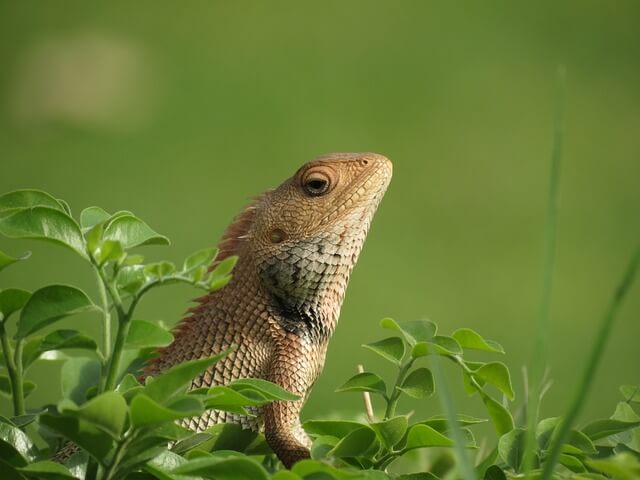
Foods bearded dragons can eat:
If you’re wondering what you should feed a bearded dragon, read our guidelines below. Bearded dragons are insectivores, which just means they thrive on insects as well as plant materials.
If you have a juvenile bearded dragon (between six and eighteen months old), give them about 80% vegetables and 20% live insects.
As your bearded dragon transitions into adulthood, give them the inverse, so 20% plant materials and 80% insects.
Getting your bearded dragon calcium:
Calcium is especially vital to a bearded dragon, especially a young one that is still growing. There are several ways to introduce more calcium into your beardie’s diet:
- Add in more high calcium vegetables like dandelions, bok choy, and collard greens.
- Dust calcium powder over their insects and vegetables to increase calcium levels.
- Make sure they’re getting their 12 hours of UVB exposure as they need this light to be able to properly absorb nutrients.
Vegetables to feed your bearded dragon:
- Peas
- Dandelion
- Green beans
- Cabbage
- Zucchini
- Pumpkin
- See our full list of vegetables to feed your bearded dragon
Note: Bearded dragons can also eat fruit in moderation. See here for a complete list of fruits bearded dragons can eat.
Insects to feed your bearded dragon:
- Crickets
- Kingworms
- Waxworms
- See our full guides to insects you can feed your bearded dragon and worms to feed your bearded dragon
Quick note: Live insects raised by you or bought from the pet store are best because they’re definitely pesticide free.
How often should you feed a bearded dragon?
During the first 3-6 months of your beardie’s life, try to feed them four to five times a day by giving them as many insects as they’d like in 10 minutes. They’re growing and need lots of protein during this stage.
Reduce the number of feedings to about two to three times a day when they’re growing into their juvenile years (between six and eighteen months).
As they become an adult, you can feed them once daily.
What should a bearded dragon not eat?
Avoid feeding your bearded dragon:
- Onions
- Leeks
- Chives
- Mushrooms
- Garlic
- Acidic fruit like oranges, lemons
- Rhubarb (can be toxic to them)
- Avocados (surprisingly, these make them ill)
- Eggplant
- Insects caught in the wild (there may be pesticides covering them)
- Venomous insects
- Dairy of any kind
- Rice and grains of any kind
- Frogs or toads
- Ham or other processed meats
Recap: Can bearded dragons eat blueberries?
- Yes! Bearded dragons can eat blueberries and in fact, they are one of the fruits that can be a staple in their fruit diet.
- Feed them a few clean organic blueberries about once a week.
- Keep them on a steady diet of insects and plant matter, with a lot of calcium mixed in.
For our full list of food to feed a bearded dragon, see our guide here.
Related articles:

